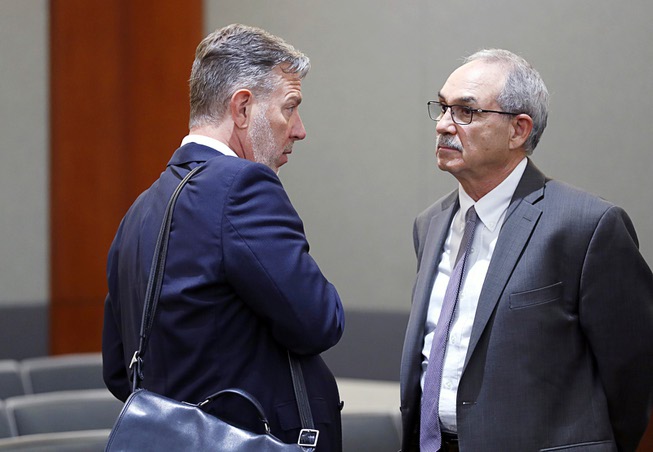
John Vellardita, right, executive director of the Clark County Education Association, talks with attorney Bradley Schrager following a hearing at the Regional Justice Center in downtown Las Vegas Wednesday, Sept. 13, 2023. District Court Judge Crystal Eller issued a strike injunction against the teachers union.
Tuesday, Nov. 28, 2023 | 8:26 p.m.
The Clark County Education Association reiterated its argument to the Nevada Supreme Court this week that an injunction by a Clark County District Court judge halting teacher sickouts was vague.
The position, reflected throughout a 36-page opening brief filed on Monday appealing the lower court’s September order, said that every injunction and restraining order must state the reasons why it was issued, state its terms specifically, and describe in reasonable detail the acts restrained or required.
“At this moment, 18,000 Clark County public school teachers and their labor union are currently subject to an injunction order that meets none of these basic legal tenets,” the brief reads.
That's been one of CCEA’s consistent responses to the injunction issued on Sept. 13 by District Court Judge Crystal Eller, who determined that concerted efforts led to large-scale teacher sick calls that closed eight Clark County School District campuses over seven school days between Sept. 1-13 and disrupted classes for at least two other schools.
It's part of an ongoing saga between the union and CCSD in their bitter fight over reaching a new teacher contract.
Eller’s injunction held CCEA liable for the sickouts, which happened during pitched and still-ongoing teacher contract negotiations, and blocked the sickouts from continuing.
Strikes by government employees, including public school teachers, are illegal in Nevada – although CCEA is fighting that law, too. A lawsuit, naming CCSD and the state as defendants, is pending in district court. Eller’s decision is the first and only time a state judge has ruled a public employee union broke the no-strike law dating back to the law’s inception in 1969.
Among its arguments in its appeal of the injunction, CCEA noted that the eight schools represent only about 2% of all CCSD schools and half of the 165 teachers who called out sick those days weren't even union members, “prompting counsel to ask whether the district court was crediting allegations that CCEA was coordinating an illegal strike, that could get everyone fired and fined, among persons who could not even be bothered to join the union.”
CCEA argued that even if some teachers did stage sickouts, the union didn’t coordinate them and can't control those people.
CCEA’s appeal also characterized the evidence tying the union to the teacher absences as “threadbare circumstantial evidence that never implicated any defendant.” In addition to the union as an organization, CCSD sued the union’s president, vice president and executive director.
CCEA’s filing attacked as insufficient the injunction, which said that “the Court finds that a strike has occurred as defined in NRS 288.074” and that the defendants “and the bargaining unit they represent” — which is to say, all CCSD teachers — “are enjoined and prohibited from continuing the strike and any other actions which amount to a strike, as defined in NRS 288.074.” NRS 288.074 is the state statute that defines “strike” to include work stoppages, slowdowns, sickouts and interference with operations.
“The district court has, essentially, told all Clark County teachers not to do anything it or (CCSD) might consider to be a strike, whatever that might mysteriously be, pursuant to a statute that has never been interpreted and that has little detail to guide any individual’s conduct,” the brief said.
The union sought to have the Nevada Supreme Court stay, or delay, the injunction immediately after it was issued using the same arguments of vagueness and overbreadth. A panel of judges rejected the motion.
Rejecting the motion to stay did not defeat the appeal, though. The union asked the state high court to schedule oral arguments for February 2024, putting the case on a fast track to be heard by the full seven-judge court given the potentially severe penalties of breaking a no-strike injunction.
Violating the injunction may lead to heavy fines and termination, suspension or demotion of participating teachers.
Public employee unions that strike are also subject to being decertified, or losing their status as official employee bargaining representatives. (CCSD has filed such a complaint with the Employee-Management Relations Board. The case is pending.)
No schools have been closed for unusually high teacher absence since the injunction was issued, and CCSD has not gone to court to pursue penalties for anyone it believes participated in the strike.
Meanwhile, Judge Eller issued a written order Tuesday confirming her September injunction. The order restated the injunction and that a rolling strike had taken place as “threatened” by CCEA and especially its executive director.
“Thus, the argument that these mass sickouts are not based on pretext, and that all of these individual teachers were sick, is preposterous and directly contradicted by the substantial circumstantial evidence,” the order read. “Given that these school closures closely followed Defendants’ threatened plan of action, the court finds that it is more likely than not that these sickouts constitute a concerted action to systematically strike, as threatened by (CCEA’s executive director) and others in public messages and public comments.”
